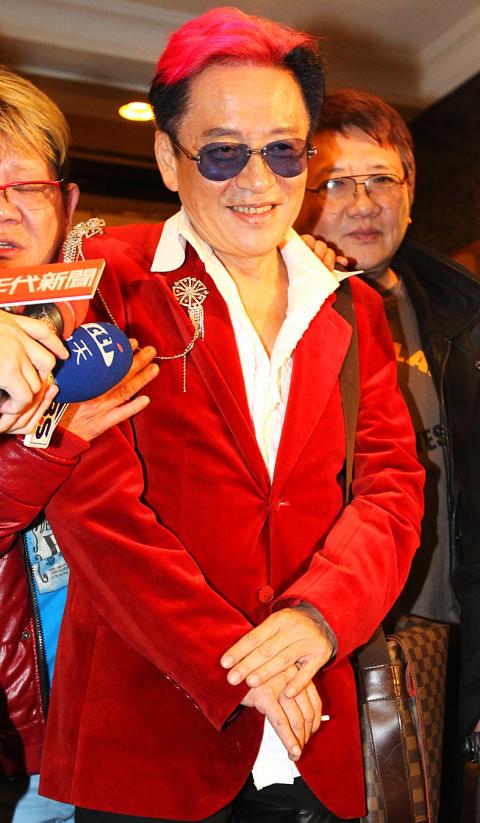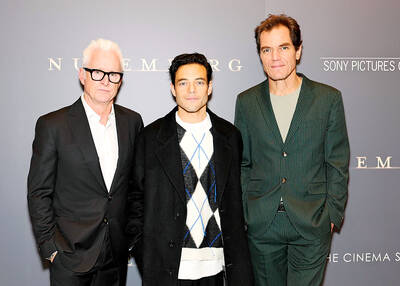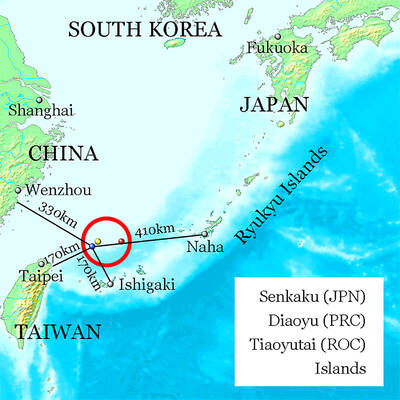The soap opera separation between TV entertainer Frankie Kao (高凌風) and his wife Chin Yu-chuang (金友莊) continues with yet another installment in an interminable tango of claims and counter claims. So carefully are the news cues placed, it has become difficult to believe that this whole drama has not all been staged for the benefit of the media.
The latest episode was set up in August last year, with a high-profile announcement that Chin would implement a cooling off period before making their separation official. They said this was out of consideration for older family members and also for their children. The deadline for this cooling off period was Tuesday, which also happened to be Kao’s 62nd birthday.
It is perhaps unsurprising that the marriage contract has been “renewed,” providing ample opportunities for a future split.

Photo: Taipei Times
To add a sense of occasion, Kao, a veteran of Taiwan’s entertainment industry, flew back from Indonesia with his eldest daughter for a birthday party in Taipei. On his arrival at Taoyuan International Airport, he announced to assembled media that the best birthday present of all would be Chin’s agreement to keep the marriage going.
“After 40 years in the entertainment industry, I’m probably past my peak, and all I want to do is quietly get on with my work,” he said.
But doing things quietly has never really been Frankie’s style. He was jubilant when Chin agreed to “maintain the status quo” (維持現狀), announcing that his hopes had been reborn, and that he considered this to be his 26th birthday party, rather than his 62nd.
Chin, Kao’s third wife, who is 20 years his junior, seemed less than enthusiastic about the arrangement, refusing to even stop off at Kao’s birthday bash.
Storm clouds loom and the media are licking their lips in expectation of further developments.
Kao has been described as an irredeemable chauvinist pig, but Chin has been captured on camera in an intimate association with businessman Chang Chih-chien (張志堅). Neither has much right to any moral high ground, which might be part of the debacle’s appeal for the great unwashed.
In other celebrity news, Yaoyao (瑤瑤, real name Kuo Shu-yao, 郭書瑤), who became famous as a “big-breasted bodacious baby face” (童顏巨乳) after appearing in an advertisement for an online game that made great use of her assets, is experiencing something of a lull in her career.
With increased fame came hot (or rather tepid) gossip about numerous romantic involvements, which is not necessarily a problem if well-managed. But the fact that she may have got back together with her former boyfriend, Liu Chian-chung (劉建忠), seems to be a real downer for celebrity watchers.
Worse still, there have been rumors that she has been looking to dump her current label, Seed Music (種子音樂), and suggestions that it has put her into “cold storage.”
The label has denied any knowledge of the alleged treachery.
In the wake of the death of Taiwanese pop diva Fong Fei-fei (鳳飛飛), there has been much interest in her legacy. Exhibitions, concerts and publications are all in the works, but her most intimate legacy is undoubtedly her son Ben Chao, a boy who she spent considerable effort keeping out of the media limelight. All her efforts came to nought after “a reader” of Next Magazine provided a contemporary photo of Chao to the publication.
The fact that the photo was published, despite the pop diva’s explicit request that his likeness not appear in print, has been cause of considerable criticism from Fong’s fans, who regard the exposure as a blatant act of disrespect for one of Taiwan’s most celebrated musicians.
Much attention has been given to the fact that Chao will inherit the diva’s considerable fortune, estimated by Next to be up to NT$4 billion (approximately US$13 million). The fear among many fans is that Chao, an average looking kid with a greater resemblance to his recently deceased father than his glamorous mother, will become the subject of undue attention because of his connection to the “Queen of Hats” (帽子歌后).

The Nuremberg trials have inspired filmmakers before, from Stanley Kramer’s 1961 drama to the 2000 television miniseries with Alec Baldwin and Brian Cox. But for the latest take, Nuremberg, writer-director James Vanderbilt focuses on a lesser-known figure: The US Army psychiatrist Douglas Kelley, who after the war was assigned to supervise and evaluate captured Nazi leaders to ensure they were fit for trial (and also keep them alive). But his is a name that had been largely forgotten: He wasn’t even a character in the miniseries. Kelley, portrayed in the film by Rami Malek, was an ambitious sort who saw in

It’s always a pleasure to see something one has long advocated slowly become reality. The late August visit of a delegation to the Philippines led by Deputy Minister of Agriculture Huang Chao-ching (黃昭欽), Chair of Chinese International Economic Cooperation Association Joseph Lyu (呂桔誠) and US-Taiwan Business Council vice president, Lotta Danielsson, was yet another example of how the two nations are drawing closer together. The security threat from the People’s Republic of China (PRC), along with their complementary economies, is finally fostering growth in ties. Interestingly, officials from both sides often refer to a shared Austronesian heritage when arguing for

Among the Nazis who were prosecuted during the Nuremberg trials in 1945 and 1946 was Hitler’s second-in-command, Hermann Goring. Less widely known, though, is the involvement of the US psychiatrist Douglas Kelley, who spent more than 80 hours interviewing and assessing Goring and 21 other Nazi officials prior to the trials. As described in Jack El-Hai’s 2013 book The Nazi and the Psychiatrist, Kelley was charmed by Goring but also haunted by his own conclusion that the Nazis’ atrocities were not specific to that time and place or to those people: they could in fact happen anywhere. He was ultimately

Last week gave us the droll little comedy of People’s Republic of China’s (PRC) consul general in Osaka posting a threat on X in response to Japanese Prime Minister Sanae Takaichi saying to the Diet that a Chinese attack on Taiwan may be an “existential threat” to Japan. That would allow Japanese Self Defence Forces to respond militarily. The PRC representative then said that if a “filthy neck sticks itself in uninvited, we will cut it off without a moment’s hesitation. Are you prepared for that?” This was widely, and probably deliberately, construed as a threat to behead Takaichi, though it